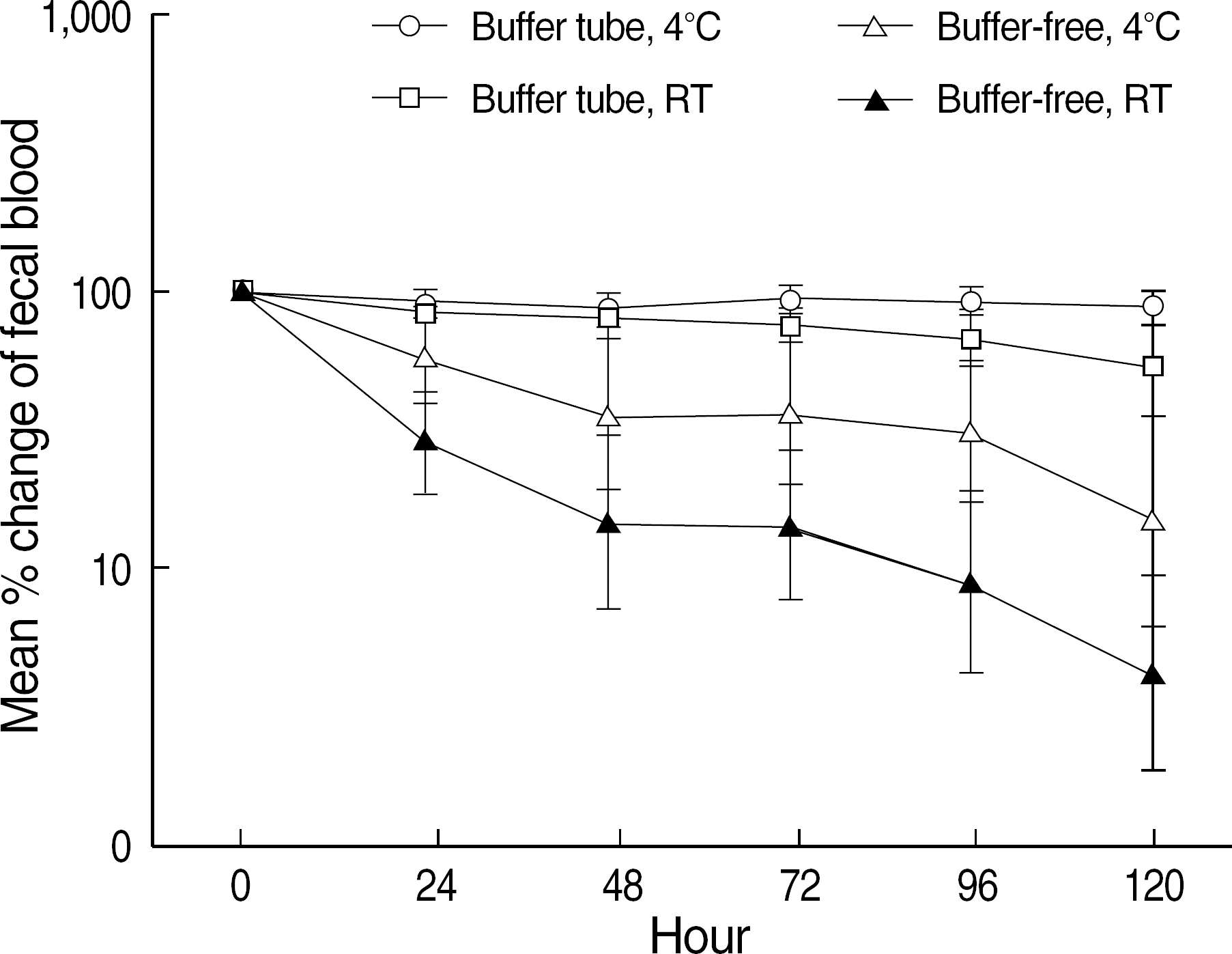Korean J Lab Med.
2009 Jun;29(3):262-267. 10.3343/kjlm.2009.29.3.262.
Influence of the Pre-Analytical Specimen Storage Conditions on the Fecal Occult Blood Test Results
- Affiliations
-
- 1Department of Laboratory Medicine, Sanggye Paik Hospital, Inje University College of Medicine, Seoul, Korea. bmshin@unitel.co.kr
- KMID: 1096980
- DOI: http://doi.org/10.3343/kjlm.2009.29.3.262
Abstract
-
BACKGROUND: Korean national cancer screening program selected fecal occult blood test (FOBT) as a primary screening method of colorectal carcinoma in adult > or =50 yr old irrespective of symptom. Notice to pre-analytical errors is especially important for the FOBT because examinees collect and submit their specimens to laboratories by themselves. We examined the influences of the fecal storage temperatures, durations and with or without buffer on the FOBT results.
METHODS
Thirty FOBT-positive specimens above 100 ng/mL were used for the study from July to August 2008. Quantitative FOBT was performed with OC-sensors II (Eiken Chemical Co., Japan). Each specimen was divided into 4 groups. Two groups in plastic buffer-free containers were kept either at 4degrees C or room temperature (25-28degrees C), respectively. Another two groups in buffer-tubes were also kept either at 4degrees C or room temperature. Each group was repeatedly examined with same method every 24 hr up to 120 hr.
RESULTS
Eleven specimens (36.7%) in buffer-free containers converted to negative results (below the 100 ng/mL) after 24 hr and 17 specimens (56.7%) did after 48 hr at room temperature. Ten specimens (33.3%) in buffer-free containers converted to negative after 48 hr at 4degrees C. Specimens contained in buffer-tubes showed little change; 3 specimens (10.0%) at room temperature and no specimen at 4degrees C showed negative conversions after 48 hr.
CONCLUSIONS
Buffer-tube minimizes false negative FOBT results during pre-analytical delay of specimen. The examinees using buffer-free containers need to be educated to hand in their specimens to laboratories as soon as possible.
MeSH Terms
Figure
Reference
-
1.Korea National Statistical Office. 2007 death and death cause statistics. http://www.nso.go.kr. (Updated on Sep. 2008. (통계청. 2007년사망 및 사망원인통계결과.http://www.nso.go.kr. (2008 년9월 보도자료.).2.Mandel JS., Bond JH., Church TR., Snover DC., Bradley GM., Schuman LM, et al. Reducing mortality from colorectal cancer by screening for fecal occult blood. Minnesota Colon Cancer Control Study. N Engl J Med. 1993. 328:1365–71.3.Mandel JS., Church TR., Bond JH., Ederer F., Geisser MS., Mongin SJ, et al. The effect of fecal occult-blood screening on the incidence of colorectal cancer. N Engl J Med. 2000. 343:1603–7.
Article4.Winawer SJ., Flehinger BJ., Schottenfeld D., Miller DG. Screening for colorectal cancer with fecal occult blood testing and sigmoidoscopy. J Natl Cancer Inst. 1993. 85:1311–8.
Article5.Kronborg O., Fenger C., Olsen J., Jorgensen OD., Sondergaard O. Randomised study of screening for colorectal cancer with faecal-occult-blood test. Lancet. 1996. 348:1467–71.
Article6.Ahlquist DA., Shuber AP. Stool screening for colorectal cancer: evolution from occult blood to molecular markers. Clin Chim Acta. 2002. 315:157–68.
Article7.Cole SR., Young GP. Effect of dietary restriction on participation in faecal occult blood test screening for colorectal cancer. Med J Aust. 2001. 175:195–8.
Article8.Cole SR., Young GP., Esterman A., Cadd B., Morcom J. A randomised trial of the impact of new faecal haemoglobin test technologies on population participation in screening for colorectal cancer. J Med Screen. 2003. 10:117–22.
Article9.Ouyang DL., Chen JJ., Getzenberg RH., Schoen RE. Noninvasive testing for colorectal cancer: a review. Am J Gastroenterol. 2005. 100:1393–403.
Article10.Smith A., Young GP., Cole SR., Bampton P. Comparison of a brush-sampling fecal immunochemical test for hemoglobin with a sensitive guaiac-based fecal occult blood test in detection of colorectal neoplasia. Cancer. 2006. 107:2152–9.
Article11.Young GP., St John DJ., Winawer SJ., Rozen P. Choice of fecal occult blood tests for colorectal cancer screening: recommendations based on performance characteristics in population studies: a WHO (World Health Organization) and OMED (World Organization for Digestive Endoscopy) report. Am J Gastroenterol. 2002. 97:2499–507.
Article12.Han WS., Choi YM., Lee DH. Comparison of guaiac method with latex method for the fecal occult blood test. Korean J Clin Pathol. 1996. 16:318–23. (한원선, 최윤미, 이도훈. 변잠혈검사에 대한 guaiac 법과 latex 법의비교. 대한임상병리학회지 1996;16:318-23.).13.Ministry of Health & Welfare and National Cancer Center. eds. Quality guidelines of colorectal cancer screening. Gyounggi: Ministry of Health & Welfare and National Cancer Center. 2008. :14-6. (보건복지부및국립암센터. 대장암검진질지침. 경기도: 보건복지부및국립암센터,. 2008:14–6.14.Park EC. Colorectal cancer screening; current problems and future directions. Intestinal Research. 2006. 4(S1):S56–65. (박은철. 대장암조기검진의현황및발전방향. 대한장연구학회 2006;4(부록1):S 56-65.).15.Malila N., Anttila A., Hakama M. Colorectal cancer screening in Finland: details of the national screening programme implemented in Autumn 2004. J Med Screen. 2005. 12:28–32.
Article16.Wong BC., Wong WM., Cheung KL., Tong TS., Rozen P., Young GP, et al. A sensitive guaiac faecal occult blood test is less useful than an immunochemical test for colorectal cancer screening in a Chinese population. Aliment Pharmacol Ther. 2003. 18:941–6.
Article17.Vilkin A., Rozen P., Levi Z., Waked A., Maoz E., Birkenfeld S, et al. Performance characteristics and evaluation of an automated-developed and quantitative, immunochemical, fecal occult blood screening test. Am J Gastroenterol. 2005. 100:2519–25.
Article18.Young GP., St John DJ., Cole SR., Bielecki BE., Pizzey C., Sinatra MA, et al. Prescreening evaluation of a brush-based faecal immunochemical test for haemoglobin. J Med Screen. 2003. 10:123–8.
Article
- Full Text Links
- Actions
-
Cited
- CITED
-
- Close
- Share
- Similar articles
-
- Influence of the Pre-Analytical Specimen Storage Conditions on the Fecal Occult Blood Test Results
- Performance Evaluation of the HM-JACKarc Analyser for Fecal Occult Blood Test
- Evaluation of the HM-JACK Automatic Analyzer for Fecal Occult Blood Test
- Evaluation of Hemo Techt NS-plus C15 Automatic Analyzer for Fecal Occult Blood Test
- Evaluation of the Ez step FOBTM for Fecal Occult Blood Test


